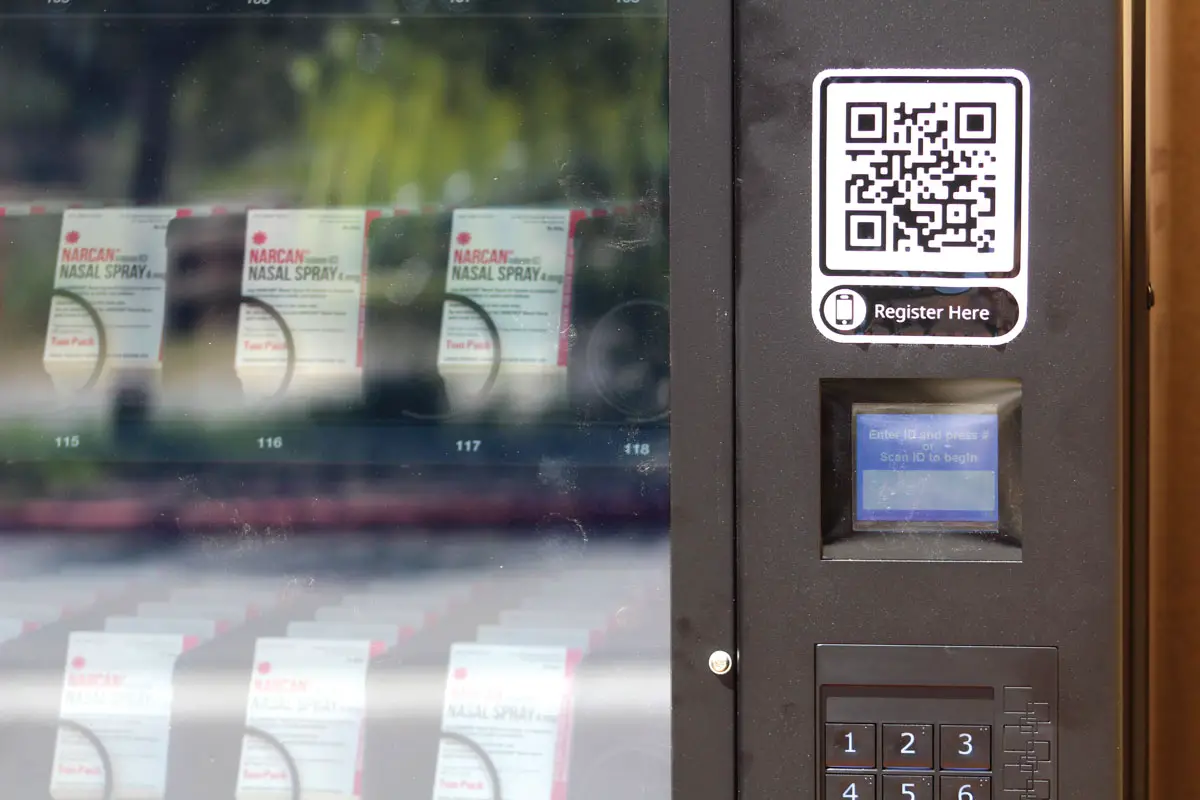PALA — In a first for San Diego County and sovereign lands across the United States, three local native tribes have implemented vending machines offering free Naloxone kits in hopes of preventing opioid-related deaths on the reservation.
Naloxone, or Narcan, is a fast-acting nasal spray that can stop fentanyl or other opioid-related overdoses.
After nearly a year of communication between tribal dignitaries and the Harm Reduction Coalition of San Diego County, the Pala Band of Mission Indians became home to the first Naloxone vending machine on sovereign land in the United States on April 13.
“It’s about prevention, and we’ll be saving peoples lives in the future,” said Pala Chairman Robert Smith. “It’s a first step. I hope there will be more to follow … hopefully we can make a difference in our community and communities like ours.”
After one was installed at the Pala Fire Station, additional machines were brought in the following weeks to two other tribes in San Diego County — the Rincon Band of Luiseño Indians in Valley Center at the fire station and the Viejas Band of Kumeyaay Indians at the Yaytaanak Wellness Center in Alpine.


These machines on native land are the latest established by the Harm Reduction Coalition, which has been working for the past year to expand Naloxone access throughout the county.
Three other machines have been set up at the McAlister Institute in Chula Vista and THE CIRCLE by Epiphany and El Dorado, both in San Diego.
Coalition founder and CEO Tara Stamos-Buesig said her team worked to respect and listen to the needs of tribal governments throughout the process and understand how historical interactions with the county government have been harmful.
The engagement and leadership of people like Smith also helped to move the process forward and bring other tribes on board.
“Pala took the lead because Chair Smith has always been one to jump on board and say, I want to do this thing for my people; let me do this thing for my people.’ Many reservations follow his lead, so we worked to get that going on Pala first,” Stamos-Buesig said.
Like many tribes, the Pala, whose approximately 1,000 members mostly live on the reservation near Palomar Mountain, has not been spared from the fast-spreading fire of fentanyl in recent years. Smith said the need for action became apparent in 2016 when sixteen tribal members died from opioid-related overdoses.

“That was a real eye-opener. I told the tribal council we need to do something,” Smith said.
Naloxone has become a powerful tool in fighting against the opioid epidemic, especially when paired with the availability of fentanyl testing strips and community education.
As part of the partnership with the coalition, the Pala Tribe’s leadership recently went through fentanyl awareness training, and several tribal buildings are equipped with their own Naloxone kits.
On the Rincon reservation, Chairman Bo Mazzetti said they are working with the coalition to gather data on the effectiveness of this new resource.
“Having accessibility can help save a life and counter the effects of this deadly drug,” Mazzetti said. “We are also working with the coalition to help collect information and data on outcomes using the machine’s Narcan. We strongly believe this is a step in the right direction, and more should be done to help address this issue.”

Smith said that while he has fielded many questions from people about the machines, most have been receptive. He hopes more people, especially those around or who know someone using drugs, can be equipped with the knowledge and resources to save a life.
“You never know, there could be an instance where it could save somebody’s life. Somebody could walk into our library, and anything could happen,” said Smith. “I’m a firm believer [that] anything educational is good.”
The vending machines were implemented at no cost to the tribes and were paid for by the county. To obtain Naloxone, individuals scan a QR code on the machine and are given a code to enter on the machine’s keypad after entering their birth date and other information.
A kit containing two Naloxone doses and instructions is then dispensed for free. There is no limit on how many times people can use the machine.
Three other tribes in the county have since contacted the coalition about obtaining these machines, Stamos-Buesig said. Over time, she hopes these machines will help spread this life-saving medication further into the community and prevent more overdose deaths.
“Narcan is a tool that we keep, just like a CPR mask or an epipen. It will save a life and give someone a new opportunity. We should all be carrying it — it’s free, it’s accessible, and it has no adverse effects. You might be the first responder,” she said.




